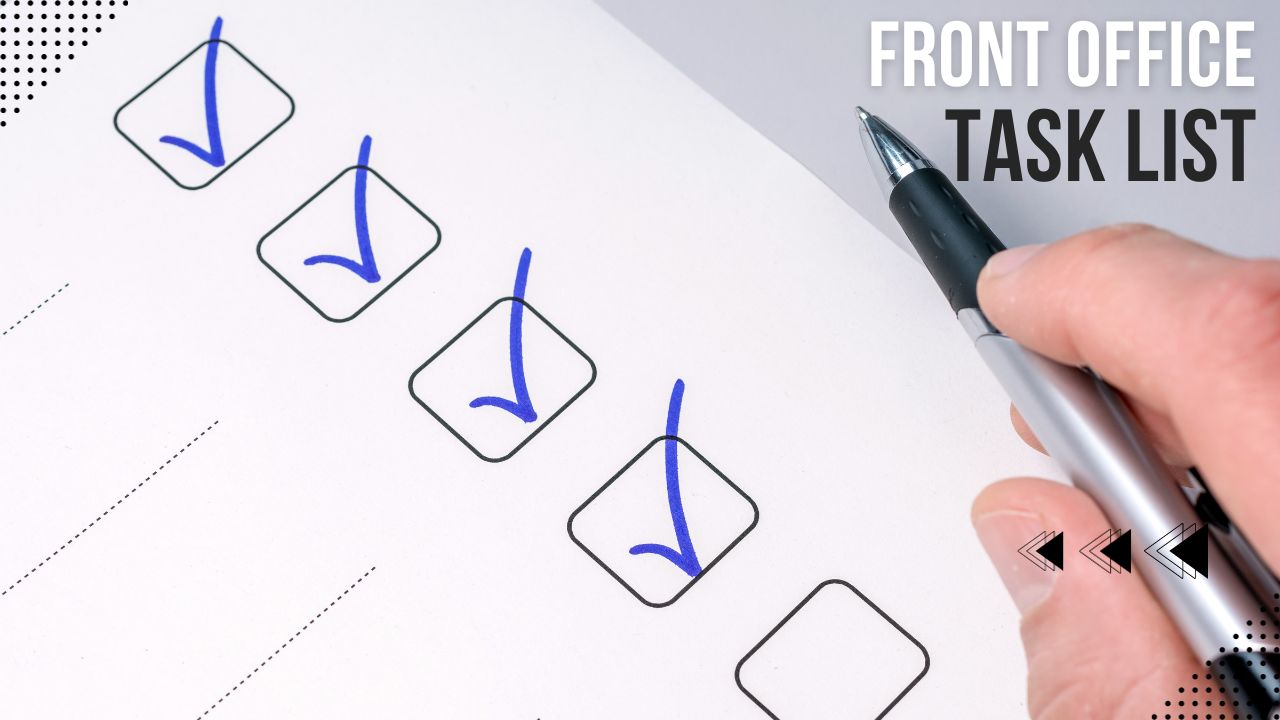Dental receptionists are essential in a dentist's office's administration and customer service.
Typical duties of a dental receptionist include scheduling appointments, taking and placing phone calls, and responding to client inquiries.
In this article, we will discuss the responsibilities of a dental receptionist, how to find your first dental job as a receptionist, advice for when you do, how to ace your first day of work, and how to adjust to a new work environment.
Let us get started...
What is a Dental Receptionist?
A dental receptionist is a professional who handles office administration in a dentist's office.
They assist the dentist, other dental professionals, and visitors to the office.
Dental receptionists are frequently the first people they meet when patients arrive and are sometimes regarded as the dental practice's representatives.
What Does a Dental Front Desk Staff Do?
The following are possible responsibilities for dental receptionists:
- Greeting clients as they enter the office and registering them for appointments
- Making appointments and managing dentists' schedules
- Responding to patient or insurance company emails, calls, and voicemails
- Adding paper files to a database
- Helping with billing or insurance claims
- Assisting clients with basic inquiries or issues regarding the dental office
- Controlling stock levels and placing additional supply orders as necessary
- Keeping the front office and lobby clean
- Sending bills, medical documents, or business correspondence via mail or fax
Up next are the top six skills that lead to a dental receptionist being successful at the tasks and role of a dental receptionist . . .
6 Skills of Dental Receptionists
A wide range of skills are required for dental receptionists to succeed in their jobs. For these professionals, the following are the most important skills:
- Interpersonal skills
- Detail orientation
- Customer service skills
- Professionalism
- Computer skills
- Organizational skills
Now that we have covered information on the role and skill of a dental receptionist let's take a look at the first of three steps to landing your first dental receptionist position . . .
Step 1: Locate the Most Appropriate Dental Receptionist Job and Position for You.
Dental receptionists are highly sought after in the job market.
Consider the following factors before choosing a first dental receptionist position:
- Where: Where do you see yourself in the future? Location. Location, location, location is the key phrase in this sentence.
- Investigate: Investigate the benefits and total compensation package offered. A salary is only one aspect of a comprehensive compensation package. A thorough examination of the benefits package is also required to find the right fit. What perks does the dental office offer, and are they helpful to you?
- Office Environment: When selecting your first dental job and career as a receptionist, it is critical to get a sense of the office culture. Looking for supportive workplace cultures that encourage teamwork, gratitude, and a positive work environment is always a good idea.
Next, what type of position are you looking for as a dental receptionist?
Step 2: Determine the Type of Position You Want
When it comes to finding a job as a dental receptionist, you have several options, as well as the type of work schedule you prefer.
Consider the following four job types:
- Employment that is permanent and full-time
- Full-time
- Part-time positions are available
- Temporary Work
Princess Dental Staffing can connect you with dental receptionist positions that match your skills and experience, regardless of what type of position you are looking for as your first dental receptionist position.
Finding your first dream job as a dental receptionist has never been simpler!
Step 3: Obtain Interviews! Position Found!
Interviews are the next step in landing your first job as a dental receptionist!
This can be accomplished by:
- Creating: Creating your resume
- Constructing: Constructing your cover letter.
- Demonstrating: Demonstrating your skills and abilities in interviews and possibly conducting a working interview.
- Showing: Showing gratitude through thank you letters after a job interview for a dental receptionist
- Securing: Getting your dream job as a dental receptionist
What comes next?
After you've got your first job as a dental receptionist...
What Should You Expect During the First Few Days?
Most companies and dental offices begin onboarding by introducing new employees to the dental team.
Even though all of the following topics were discussed during the interview process, the first day will usually include a review of:
The daily routine, as well as the front- and back-office flow
The values, mission, and culture of the practice
The responsibilities and job description, as well as a ranking of which systems must be learned first
Training and reading material expectations
Who will provide training and/or answers in various job-related areas?
A timetable for achievement of milestones and, if necessary, performance evaluations.
Now, let's look at eight tips to help you make your first day of work as a dental receptionist a success…
8 Tips on Your First Day of Work Success as a Dental Receptionist
When starting a new job, there can be a lot to learn, including who your new coworkers are and how the team works together to create a successful dental office.
While every workplace and dental office is unique, you can prepare by following general guidelines.
Here are some pointers to help you have a successful first day at work!
- Prepare to Learn a lot
Your employer at the dental office may keep things simple on day one to lead to a successful onboarding experience as you join the team at your new position as a dental receptionist.
Even if you do not receive a list of long-term goals immediately, you should still prepare to be a sponge and soak up as much information as possible. On the first day of work, you might discover the following:
- Mission, values, and policies of the company
- A summary of your role and responsibilities
- Instruments, logins, and passwords
- Names and roles of team members
- Show Up Early
Make sure to arrive at your practice at least 15 minutes early. To find the ideal departure time and route, you should plan many routes to the building in advance and try them during the week before your first day.
- Create a List of Questions
Making a list of questions before your first day of work may help you have a productive and informative day.
You'll almost certainly get a lot of questions after receiving your offer letter. If you don't write down your questions, you might forget about them once you get to work.
Because the first day can be hectic, having questions ready for when you have free time is beneficial.
- Get Organize
When you organize your dedicated workspace, assemble all of the required supplies, such as sticky notes, notepads, and pencils, if you want to be as productive as possible. On the first day, organizing your space can help you feel more at ease in a new environment.
- Master Dental Office Technology and Tools
When you arrive at work prepared, your coworkers will appreciate it. Every company operates using specific technology, tools, programs, and systems.
You'll have a better chance of success if you familiarize yourself with these tools early on and then master their use.
If a dental office is using a technology or tool you don't have experience with, ask for training opportunities or mentor opportunities to learn how to successfully use the technology, tool, or system.
- Use Positive Body Language
Use positive body language during orientation to demonstrate that you're paying attention, such as sitting or standing straight with your shoulders back. When it is acceptable, turn to face the person speaking, make eye contact, and smile. Using this body language might also come across as approachable and friendly.
- Ask About Professional Expectations
On the first day, your employer should provide you with a list of your duties. Make notes about the many aspects of the job and seek clarification as necessary. Knowing the requirements for the position is vital so you can quickly meet and exceed them. It also makes evaluations easier to understand.
- Be Ready for Anything
The first days can vary significantly depending on the company and the industry. Some companies dedicate at least a week to orientation and training, while others may let employees start working immediately. Once you've learned the fundamentals of the role and practice, be ready to fulfill your obligations. If you want more information about what's included on the first day, reach out to your company contact, so you have an idea of what to expect.
One Last Tip
You never know what will happen on your first day of work, but with some planning and a healthy dose of self-assurance, you can make an excellent first impression on your new coworkers.
Remember that your career will consist of much more than this one day. In the coming weeks, you'll have numerous opportunities to demonstrate your abilities and strengthen your bonds with your coworkers. When you start your new job on the right foot, you can set the tone for the rest of the day.
More Information
- Dental Front Office Receptionist Tips
- Dental Receptionist Skills Checklist
- Dental Receptionist Working Interview
- Thank You Letter After Interview for Dental Front Office Receptionist
- Objectives for Dental Receptionist Resumes and Examples
- How Should a Dental Receptionist Answer the Phone?
- 4 Reasons to Consider a Career as a Dental Office Manager
Related Articles

Is Your Dental Salary Enough? Exploring Ways to Boost Your Income with Princess Dental Staffing
Does your dental salary reflect the value you bring to the practice? If you've ever wondered if you're making enough money as a dental assistant or hygienist, you're not alone.
Chris Lewandowski
April 08, 2024
Ready to get started?
Join Princess Dental Staffing for free!

